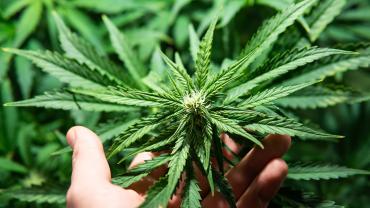
The endocannabinoid system (ECS) plays a role in sleep, potentially through its interactions with the brain and the sleep/wake cycle. Endocannabinoids, or endogenous cannabinoids, modulate functions throughout the body including those within the brain by activating the cannabinoid type 1 (CB1) receptor and CB2 receptor. These receptors are found in many areas, including those located on the neuronal axon terminals, with activation contributing to presynaptic actions on neurotransmitter release. The ECS may have a bidirectional relationship with the circadian rhythm and sleep/wake cycle.
Studies have found a circadian rhythm to the circulating endocannabinoids, with 2-arachindonolylgylercol (2-AG) levels increasing from mid-sleep to early afternoon. Thus, 2-AG may have potential associations with modulating the wake cycle. Anandamide (AEA) has a biphasic pattern, with a peak in early sleep and mid-afternoon with a mid-morning nadir. AEA is associated with sleep-promoting effects. The ECS receptors may also have a circadian rhythm. As such, endocannabinoids may contribute to the regulation of circadian rhythms and sleep, although the mechanisms remain under investigation.
Some studies have shown that AEA may play a role in the release of adenosine in the anterior hypothalamus, which is a known regulator of non-rapid eye movement (NREM) sleep. Therefore, AEA could potentially induce NREM sleep. Endocannabinoids may also act synergistically with acetylcholine and glutamate to modulate REM sleep. Endocannabinoid activity via the CB1 receptor may also be necessary to support the stabilization of NREM sleep.
Phytocannabinoids or plant cannabinoids can activate the ECS. As such, the ECS may support sleep.* Researchers are now testing the potential of the ECS in supporting sleep. One large retrospective case series at a psychiatric outpatient clinic tested using cannabinoids (CBD) as an adjunct therapy in patients with an anxiety or sleep disorder. Those who took the CBD experienced a reduction in anxiety scores and an improvement in sleep scores. In a randomized, placebo-controlled trial, participants who were overweight, but otherwise healthy, took a CBD-containing hemp oil extract for 6 weeks. The hemp oil group experienced improvements in sleep quality and quantity, in the stress response, in high-density lipoprotein cholesterol levels, and in overall perceived pleasure with life.
Many actions may support a normal circadian rhythm and restful sleep, including dietary and lifestyle factors. Supporting the systems involved in regulating sleep and circadian rhythms, such as the ECS, may also promote quality sleep.* Studies are also demonstrating the potential for phytocannabinoids to provide additional support for restful sleep.*
By Kendra Whitmire, MS, CNS